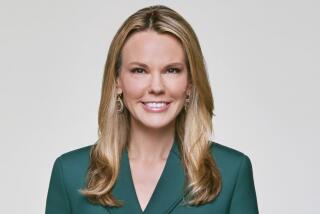New deal for PBS head
- Share via
NEW YORK — Pat Mitchell has reached a tentative deal to remain at the helm of the Public Broadcasting Service for another three years.
Her new contract, for which she is in final discussions with the PBS board, follows a sometimes controversial three-year stint in which she quickly immersed herself in the thorny problems confronting PBS at a time of intense competition and restricted funds. The length of the new contract is under discussion, but she is expected to remain to execute PBS’ new strategic plan, which runs through 2006.
Mitchell, who will turn 60 next week, came to PBS in March 1999 from CNN, where she was head of CNN Productions, overseeing the company’s documentary series on topics such as the Cold War. She stepped into a job fraught with political fiefdoms and heated debate about the best way for public television -- which is not a traditional network but rather a coalition of locally autonomous stations -- to increase its audience. Mitchell and her team, pushing survival strategies, have often found themselves opposed by those in the system who fear public television will lose its core noncommercial, local-focused mission.
“You’d have to describe the first three years of any job as challenging, but this one was particularly so,” said Mitchell, citing the “bad economy and acts of terrorism and all kinds of things that shifted focus and put an additional fund-raising burden on public television.”
A first round of initiatives -- picking up the failed Fox series “American High” and rescuing the Latino drama “American Family” after CBS passed on the pilot -- had a hip Hollywood flavor that was a radical, not totally successful shift from PBS’ sober British dramas. Mitchell has also pushed public affairs programming, adding a Friday night series hosted by Bill Moyers.
At the same time, Mitchell, whose motto is “Keep the best and reinvent the rest,” took on several of PBS’ popular series. The long-running British program “Mystery!” was deemed too close to what could be found elsewhere on cable and was pushed to reinvent itself with American stories. A first installment of a Tony Hillerman Native American detective story did well in November and will now be followed by two more Hillerman tales.
A revamping of “Wall Street Week With Louis Rukeyser” backfired, however, and the popular host left to launch a competing show on CNBC.
Following the Sept. 11, 2001 terror attacks, PBS’ ratings hit historic lows for several months. Last fall, however, the audience came back, jumping 18% in prime time. The service also won a number of prestigious awards for its documentary and news programming following the Sept. 11 attacks, including a duPont-Columbia Gold Baton award for its “Frontline” terrorism series, which will be awarded tonight.
“The good news for me is that we’ve had the best fall in three years,” Mitchell said. “It indicates to me that the programming strategy is beginning to work.” She said the new strategic plan will be particularly focused on finding revenue.
“All the plans we have programmatically are stressed by a lack of risk capital and resources to do new innovative work we feel the audience wants and we should deliver,” she said. PBS anticipates no problem with its annual Congressional appropriations, she said, and she is even hoping that there might be new sources of federal funds to tap.
Although viewer contributions are up this year, PBS just lost a major corporate underwriter when Exxon Mobil said it would end support of “Masterpiece Theatre.” “Like it or not, I’m going to have to spend a lot of time on these issues,” she said.
More to Read
The biggest entertainment stories
Get our big stories about Hollywood, film, television, music, arts, culture and more right in your inbox as soon as they publish.
You may occasionally receive promotional content from the Los Angeles Times.










